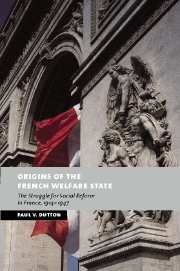Book contents
- Frontmatter
- Contents
- List of figures
- List of tables
- Acknowledgments
- List of abbreviations
- Introduction
- 1 An industrial model of family welfare
- 2 A mutual model for social insurance
- 3 Battle for control of social welfare: workers versus employers
- 4 Parliament acts
- 5 Challenges from city and countryside, 1930–1939
- 6 Retrenchment and reform, 1939–1947
- Conclusion
- Bibliography
- Index
Introduction
Published online by Cambridge University Press: 13 July 2009
- Frontmatter
- Contents
- List of figures
- List of tables
- Acknowledgments
- List of abbreviations
- Introduction
- 1 An industrial model of family welfare
- 2 A mutual model for social insurance
- 3 Battle for control of social welfare: workers versus employers
- 4 Parliament acts
- 5 Challenges from city and countryside, 1930–1939
- 6 Retrenchment and reform, 1939–1947
- Conclusion
- Bibliography
- Index
Summary
On a rainy December morning in 1995 Pierre Laroque gazed out the window of his apartment on Paris' Avenue Victor Hugo and contemplated the snarled traffic below. France's greatest strike since May 1968 had paralyzed the city's metro trains and buses, causing a morass of automobiles on streets throughout the metropolis. Strikers' wrath was aimed at a government plan to trim the welfare state that Laroque had done so much to create. The plan, authored by President Chirac's first prime minister, Alain Juppé, sought modest reductions in benefits as part of a larger package to halt welfare spending deficits. Yet the public-sector unions — supported by a significant portion of the populace — viewed “le plan Juppé” as but a first step in the dismantling of France's generous system of social protections. I had come to interview Laroque about the 1930s and his years at the Conseil d'Etat. He seemed pleased with my interest in the interwar period, perhaps because he had grown weary of the recent media inquiries that focused on his better known role as the founding director of social security after 1945. France had just marked the fiftieth anniversary of its postwar welfare state and Laroque, quite inescapably, had been the subject of numerous television and newspaper interviews.
- Type
- Chapter
- Information
- Origins of the French Welfare StateThe Struggle for Social Reform in France, 1914–1947, pp. 1 - 13Publisher: Cambridge University PressPrint publication year: 2002
- 1
- Cited by

